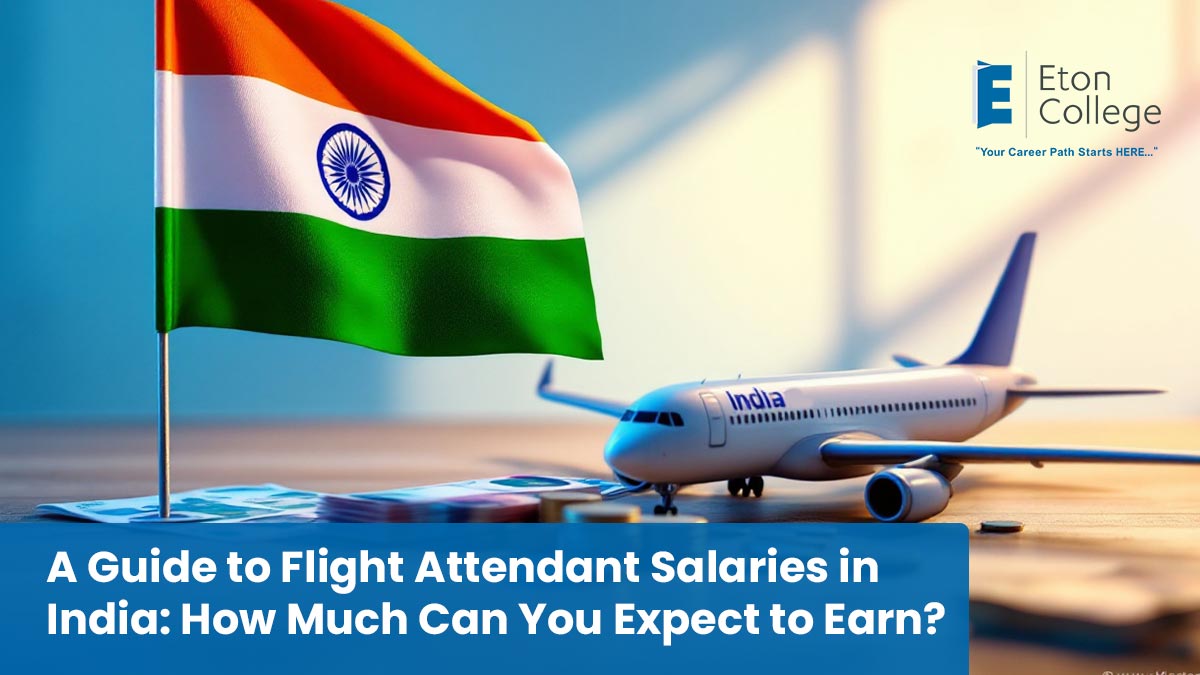- Starting salaries for flight attendants in India range from ₹25,000 to ₹40,000 per month, with higher potential earnings as experience grows.
- International airlines generally offer higher pay than domestic carriers, often due to longer flight hours and additional responsibilities.
- Additional benefits for flight attendants include travel perks, health insurance, layover allowances, and performance bonuses.
- Experience plays a significant role in salary growth, with senior flight attendants earning between ₹50,000 and ₹1,00,000 per month.
- Career advancement is possible through roles like Lead Flight Attendant or In-flight Service Manager, with increased responsibilities and pay.
The aviation industry in India is soaring, with increasing demand for flight attendants who ensure passenger safety, comfort, and overall experience during flights. As more people aspire to join this dynamic career, questions about earnings often come to mind.
So, what can a flight attendant expect to earn in India, and what factors influence their salary? Here’s an in-depth guide to help you understand the earning potential and pathways to a career in the skies.
Starting Salary for Flight Attendants in India
Entry-level salaries for flight attendants in India generally range between ₹25,000 and ₹40,000 per month. This amount may vary depending on factors such as the airline, location, and prior experience. Domestic carriers like Indigo, Air India, and SpiceJet typically offer competitive salaries for new hires, but the perks, bonuses, and incentives can further add to the total package.
As you gain experience and build a track record of outstanding service, your salary can rise significantly. Senior flight attendants or those working with international airlines often earn between ₹50,000 and ₹1,00,000 per month, with some top carriers offering even higher packages.
Key Factors That Influence a Flight Attendant’s Salary
While the flight attendant salary in India varies widely, some factors consistently impact earnings:
- Airline Type: International airlines generally offer higher pay compared to domestic carriers. Airlines that operate long-haul flights compensate their staff for the extra hours and demands of international travel.
- Experience: With more years on the job, flight attendants can move into senior roles such as lead attendant or cabin crew manager, which come with increased pay and responsibility.
- Location: Major cities and airports often offer better compensation to flight attendants due to the higher demand and cost of living in these areas.
- Educational Background and Training: High-quality training from reputable institutions can set candidates apart in the job market. Programs like Eton College’s Flight Attendant Preparation Program equip aspiring flight attendants with critical skills, which can be a valuable asset in salary negotiations.
- Language Skills and Certifications: Being multilingual or holding specialized certifications (like First Aid or CPR) can give candidates a competitive edge, particularly for airlines that value customer experience for international travelers.
How Do Perks and Benefits Add to a Flight Attendant’s Salary?
Beyond the base salary, flight attendants enjoy numerous perks that make the profession even more attractive. These include:
- Travel Benefits: Free or discounted airline tickets for themselves and sometimes even for family members.
- Accommodation and Layover Allowances: Many airlines cover accommodation and meals during layovers, reducing personal expenses.
- Health and Insurance Benefits: Most airlines provide medical insurance, and some even offer retirement benefits, ensuring long-term financial security.
- Performance Bonuses: Airlines often reward attendants who demonstrate excellent customer service, punctuality, and dedication, which adds to the overall compensation.
- Uniform Allowances and Grooming Benefits: Airlines provide allowances for maintaining uniforms, which further enhances the financial package.
Salary Growth and Career Progression for Flight Attendants
In India, a flight attendant’s salary can grow substantially with experience. After a few years, they may be promoted to a senior flight attendant or lead position, which typically comes with a higher salary and additional responsibilities. Moving up the ranks, flight attendants can advance to positions like In-flight Service Manager, where salaries may exceed ₹1,50,000 per month, depending on the airline and additional responsibilities.
Many airlines also offer opportunities to transition into ground-based roles such as training, recruitment, or cabin crew management. This diversity in career paths provides flight attendants with options to diversify and enhance their earnings over time.
Average Flight Attendant Salary in India
On average, a flight attendant in India can expect to earn around ₹50,000 to ₹75,000 per month. For international airlines or with significant experience, this number can rise to ₹1,00,000 per month or more. As mentioned earlier, additional benefits, performance bonuses, and travel perks further enhance the overall compensation package, making the profession rewarding both financially and experientially.
How Eton College Prepares You for a High-Flying Career
Starting a career as a flight attendant can be competitive, but quality training programs provide a significant advantage. Eton College offers a comprehensive Flight Attendant Preparation Program that not only covers in-flight safety, customer service, and first aid but also provides essential industry insights and practical skills. Graduates from such programs are well-prepared for interviews and on-the-job challenges, positioning them for better salary prospects and career growth in the airline industry.
Embarking on a Rewarding Career in the Skies
Choosing to become a flight attendant in India can open the door to a fulfilling career that combines attractive salaries with the opportunity to travel and meet people from all walks of life. The flight attendant salary in India may vary depending on experience, airline, and other factors, but the perks and career progression opportunities make it a promising profession.
If you’re looking to enter this exciting field, quality training is a worthwhile investment. Programs like Eton College’s Flight Attendant Preparation Program offer the knowledge and skills to help you succeed, whether you’re aiming for a role with a top domestic airline or an international carrier. So, are you ready to reach new heights? Explore a career as a flight attendant and discover a world of opportunities in the skies!
FAQs
- Do international airlines pay more than domestic airlines in India?
- Yes, generally, international airlines offer higher salaries than domestic airlines. This is because international routes often require longer hours, additional responsibilities, and handling passengers from diverse backgrounds, which commands a higher pay scale.
- What additional benefits do flight attendants receive apart from their salary?
- Flight attendants enjoy several perks beyond their salary, such as free or discounted travel for themselves and family members, layover allowances, health insurance, performance bonuses, and uniform and grooming allowances.
- Are there any certifications that can help increase a flight attendant’s salary?
- Yes, certifications in First Aid, CPR, or multilingual proficiency can enhance a flight attendant’s profile, making them more valuable to employers and potentially leading to a higher salary, especially with international airlines.
- Can flight attendants earn bonuses or incentives in addition to their base salary?
- Yes, many airlines offer bonuses and incentives for performance metrics like punctuality, customer service ratings, and tenure. These can range from monthly performance bonuses to yearly incentives, depending on the airline’s policies.
- What career growth opportunities are available for flight attendants in India?
- Flight attendants can advance to senior positions such as Lead Flight Attendant or In-flight Service Manager, which come with higher salaries and added responsibilities. They can also transition into ground roles, like recruitment, training, or cabin crew management.




